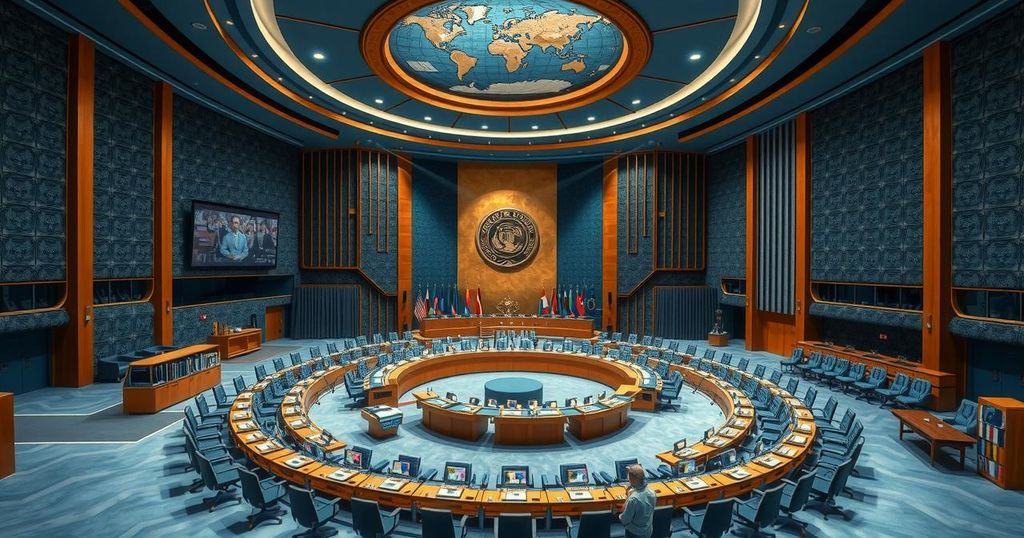Global news
ABU DHABI, ALI KHAMENEI, ANWAR GARGASH, ARAB, ASIA, CHINA, DIPLOMACY, DONALD TRUMP, FOREIGN POLICY, GULF, INTERNATIONAL RELATIONS, IRAN, ISRAEL, MEXICO, MIDDLE EAST, NORTH AMERICA, SAUDI ARABIA, SCOTT BESSENT, SHEIKH TAHNOON BIN ZAYED AL NAHYAN, TEHRAN, U. S, UAE, UNITED ARAB EMIRATES, UNITED STATES, US, WASHINGTON, WHITE HOUSE, YEMEN
Fatima Khan
0 Comments
UAE’s Rising Role as a Key U.S. Ally in Middle East Geopolitics
The United Arab Emirates (UAE) is emerging as a vital ally for U.S. interests in the Middle East, particularly under President Trump’s leadership, which aims to curtail Iranian influence. During Sheikh Tahnoon’s visit, discussions highlighted cooperation on security and AI infrastructure investments. The strategic relationship is bolstered by the UAE’s role in mediating regional tensions and promoting stability.
The United Arab Emirates (UAE) is establishing itself as a significant ally for U.S. interests in the Middle East, particularly as President Donald Trump aims to counter Iran and its coalition opposing Israel. This relationship was highlighted during a meeting in Washington, where Trump affirmed their collaboration towards achieving peace and security in the region. Sheikh Tahnoon bin Zayed, UAE National Security Adviser, attended and sought support for a $30 billion AI infrastructure fund during his discussions with U.S. leaders.
The Trump administration regards Gulf partners such as the UAE and Saudi Arabia as crucial allies in the Middle East. Through initiatives like the Abraham Accords, which normalize relations between Israel and various Gulf nations, the U.S. has solidified regional alliances aimed at diminishing Iran’s influence. This partnership also extends to addressing the conflict with Iran-backed Houthi rebels in Yemen, striving to stabilize the region and curb Tehran’s expansion.
President Trump hosted Sheikh Tahnoon at the White House and honored him with a dinner attended by senior U.S. officials. U.S. Secretary of the Treasury Scott Bessent stressed the vital need for cooperation to restrict Iran’s nuclear ambitions and its support for regional terrorist activities. Recently, Emirati diplomat Anwar Gargash delivered a letter from Trump to Iran’s Supreme Leader, indicating a desire to negotiate on nuclear matters.
Amidst rising competition in AI technology with China, the UAE seeks to enhance its position as a global leader. Previous tensions with the Biden administration over the UAE’s relations with China and restrictions on AI chip exports have not deterred its ambitions. During his visit to Washington, Sheikh Tahnoon met with prominent figures, such as National Security Adviser Mike Waltz and technology innovators Elon Musk and Larry Ellison, to foster development in AI.
In a significant development, MGX, Sheikh Tahnoon’s investment firm, alongside prominent partners, announced the formation of the AI Infrastructure Partnership (AIP). This initiative aims to gather $30 billion for AI projects, potentially unlocking a further $100 billion in investments and financing.
Throughout the meeting, President Trump noted the enduring friendship, stating, “The evening demonstrated the long-standing ties and bonds of friendship between our countries.” Meanwhile, Sheikh Tahnoon highlighted discussions with Elon Musk regarding AI’s transformative potential for responsive government systems. UAE political science expert Abdulkhaleq Abdulla emphasized Washington’s respect for the UAE’s role in promoting regional stability and its mediation capacity between the U.S. and Iran.
As the U.S. and Iran approach a critical juncture regarding Iran’s nuclear advancements, the UAE’s involvement is anticipated to be pivotal alongside the evolving dynamics concerning the Israel-Hamas conflict in Gaza.
In summary, the growing partnership between the United States and the United Arab Emirates signifies a strategic alignment to counter Iranian influence and address security concerns in the Middle East. The UAE’s initiatives in advancing AI technology and its mediating role between the U.S. and Iran enhance its stature as a significant ally. President Trump’s reaffirmation of friendship with Sheikh Tahnoon highlights both nations’ commitment to fostering peace and stability in the region, with substantial implications for future geopolitical developments.
Original Source: www.newsweek.com




Post Comment